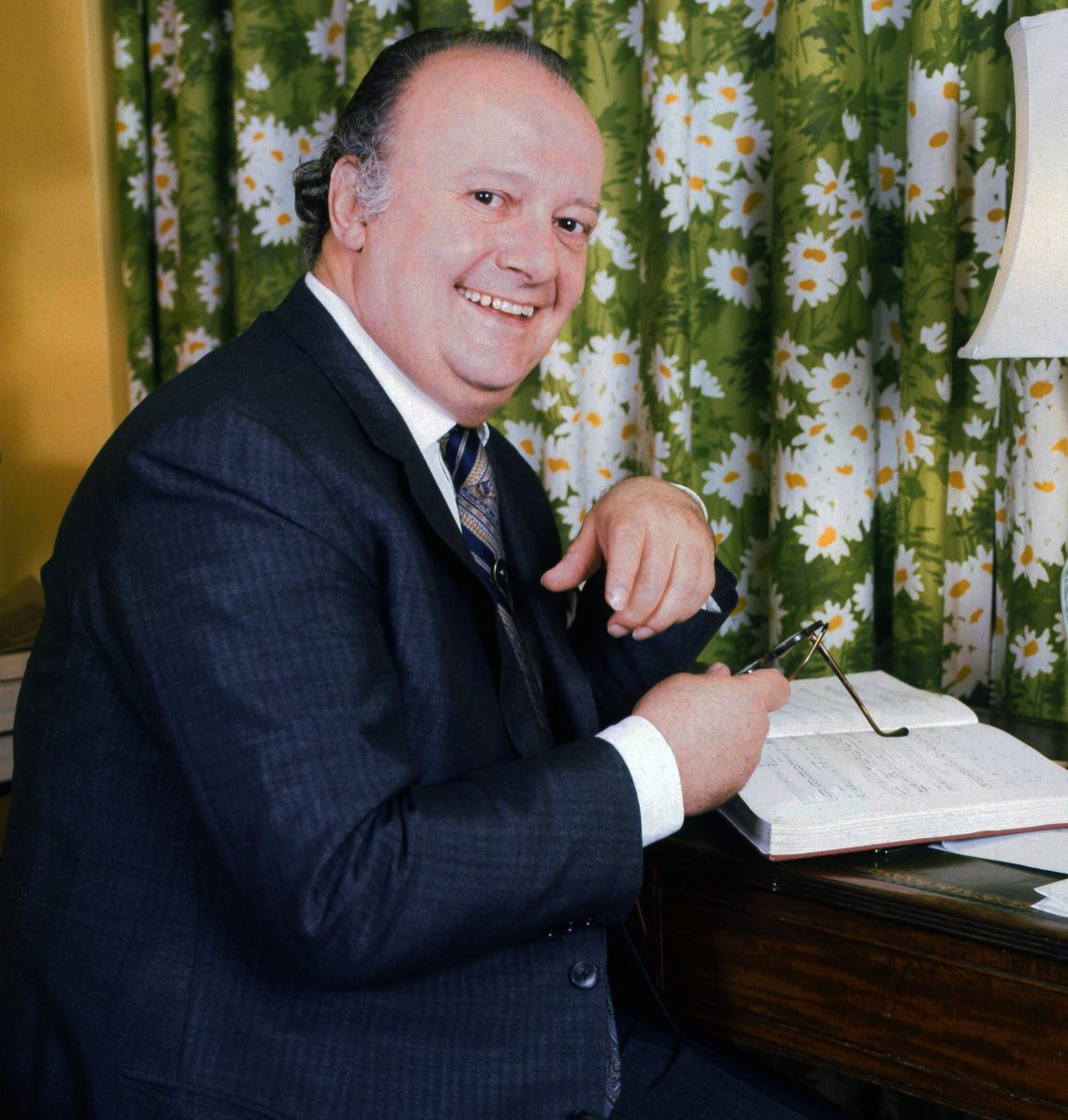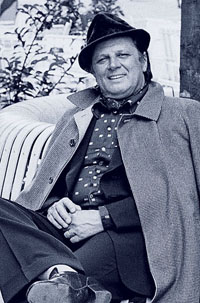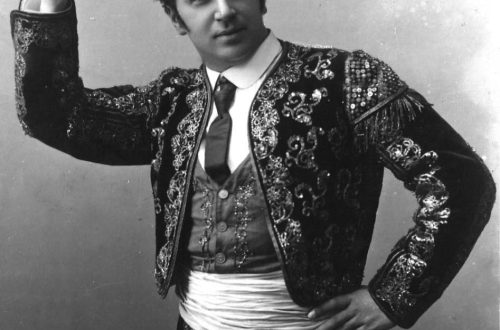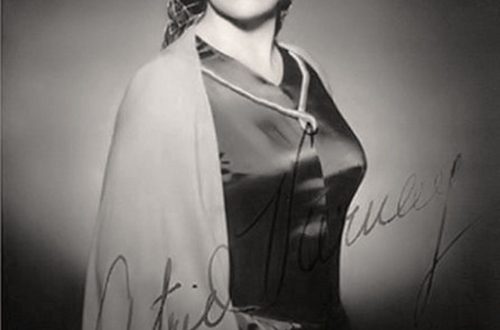
Tito Gobbi (Tito Gobbi) |
Tito Gobbi
The name of Tito Gobbi, an outstanding singer of our time, is associated with many bright pages in the history of the musical culture of Italy. He had a voice of great range, rare in beauty of timbre. He was fluent in vocal technique, and this allowed him to reach the heights of mastery.
“The voice, if you know how to use it, is the greatest power,” says Gobbi. “Believe me, this statement of mine is not the result of self-intoxication or excessive pride. At the end of World War II, I often sang for the wounded in hospitals, where the unfortunate from all over the world gathered. And then one day some guy – he was very bad – in a whisper asked me to sing “Ave Maria” to him.
This poor fellow was so young, so discouraged, so alone, because he was far from home. I sat down by his bed, took his hand and sang “Ave Maria”. While I was singing, he died – with a smile.
Tito Gobbi was born on October 24, 1913 in Bassano del Grappa, a town on the foothills of the Alps. His father belonged to an old Mantua family, and his mother, Enrika Weiss, came from an Austrian family. After graduating from school, Tito enters the University of Padua, preparing himself for a career in law. However, with the development of a strong, sonorous voice, the young man decides to get a musical education. Leaving law, he begins to take vocal lessons in Rome, with the then famous tenor Giulio Crimi. At Crimi’s house, Tito met the talented pianist Tilda, daughter of the eminent Italian musicologist Raffaelo de Rensis, and soon married her.
“In 1936, I began to perform as a comprimano (performer of minor roles. – Approx. Aut.); I had to learn several roles at the same time, so that in case of illness of one of the performers, I would be ready to immediately replace him. Weeks of endless rehearsals allowed me to penetrate into the essence of the role, to gain sufficient confidence in it, and therefore were not at all a burden to me. The opportunity to appear on stage, always unexpected, was extremely pleasing, especially since the risk associated with such suddenness was minimized at the Teatro Real in Rome at that time thanks to the invaluable help of a huge number of excellent tutors and the generous support of partners.
Much more trouble hid the so-called small roles. They usually consist of just a few phrases scattered around different actions, but at the same time, many traps are hidden in them. I am not alone in my fear of them…”
In 1937, Gobbi made his debut at the Adriano Theater in Rome as Germont the Father in the opera La Traviata. The musical talent of the young singer was noted by the capital’s theatrical press.
Having won in 1938 at the International Vocal Competition in Vienna, Gobbi became a scholarship holder of the school at the La Scala theater in Milan. Gobbi’s true debut in the famous theater took place in March 1941 in Umberto Giordano’s Fedora and was quite successful. This success was consolidated a year later in the role of Belcore in Donizetti’s L’elisir d’amore. These performances, as well as the performance of parts in Verdi’s Falstaff, made Gobbi speak of an outstanding phenomenon in Italian vocal art. Tito receives numerous engagements in various theaters in Italy. He makes the first recordings, and also acts in films. In the future, the singer will make more than fifty complete recordings of operas.
S. Belza writes: “…Tito Gobbi was by nature endowed with remarkable not only vocal, but also acting skills, temperament, an amazing gift of reincarnation, which allowed him to create expressive and memorable musical stage images. This made him especially attractive to filmmakers, who invited the singer-actor to star in more than twenty films. Back in 1937, he appeared on the screen in Louis Trenker’s The Condottieri. And soon after the end of the war, Mario Costa began filming the first full-length opera film with his participation – The Barber of Seville.
Gobbi recalls:
“Recently, I again watched a film based on this opera in 1947. I sing the title part in it. I experienced everything anew, and I liked the film almost more than then. It belongs to another world, distant and lost, but hopefully not irretrievably. How I enjoyed in my youth when I learned The Barber with its incomparable changes of rhythm, how I was literally fascinated by the richness and brightness of the music! Rare opera was so close to me in spirit.
From 1941 to 1943 Maestro Ricci and I worked on this role almost daily. And suddenly the Rome Opera invites me to perform in the premiere of The Barber; Of course, I could not refuse this invitation. But, and I remember it with pride, I had the strength to ask for a delay. After all, I knew that in order to really prepare, to feel self-confidence, it takes time. Then the theater directors were still thinking about the improvement of the artist; the premiere was graciously agreed to be postponed, and I sang The Barber for the first time in February 1944.
For me, this was an important step forward. I achieved considerable success, I was praised for the purity of the sound and the liveliness of the singing.
Later, Gobbi will once again be removed from Costa – in “Pagliacci” based on the opera by Leoncavallo. Tito performed three parts at once: Prologue, Tonio and Silvio.
In 1947, Gobbi successfully opened the season with the part of Mephistopheles in the stage version of Berlioz’s Damnation of Faust. Numerous foreign tours began, which strengthened Gobbi’s fame. In the same year, the singer was enthusiastically applauded by Stockholm and London. In 1950, he returned to London as part of the La Scala Opera Company and performed on the stage of Covent Garden in the operas L’elisir d’amore, as well as Falstaff, Sicilian Vespers and Verdi’s Otello.
Later, Mario Del Monaco, listing his most eminent colleagues, calls Gobbi “an unsurpassed Iago and the finest singer-actor.” And at that time, for the performance of leading roles in three Verdi operas, Gobbi was awarded a special prize, as one of the most brilliant baritones who performed at that time in Covent Garden.
The mid-50s was the period of the singer’s highest creative upsurge. The largest opera houses in the world offer him contracts. Gobbi, in particular, sings in Stockholm, Lisbon, New York, Chicago, San Francisco.
In 1952 Tito sings at the Salzburg Festival; he is unanimously recognized as the unsurpassed Don Giovanni in Mozart’s opera of the same name. In 1958, Gobbi participated in the performance of Don Carlos at London’s Covent Garden Theatre. The singer who performed the part of Rodrigo received the most rave reviews from critics.
In 1964, Franco Zeffirelli staged Tosca at Covent Garden, inviting Gobbi and Maria Callas.
Gobbi writes: “The Covent Garden Theater lived in insane tension and fear: what if Callas refuses to perform at the last moment? Sander Gorlinski, her manager, had no time for anything else. The presence of unauthorized persons at all rehearsals is strictly prohibited. Newspapers were limited to laconic reports confirming that everything was going well …
January 21, 1964. Here is a description of that unforgettable performance, written by my wife Tilda in her diary the next morning:
“What a wonderful evening! A wonderful staging, although for the first time in my life the aria “Vissi d’arte” did not receive applause. (My opinion is that the audience was so fascinated by the spectacle that they did not dare to interrupt the action with an inappropriate applause. – Tito Gobbi.) The second act is simply incredible: two giants of opera art bowed to each other before the curtain, like courteous rivals. After an endless standing ovation, the audience took over the stage. I saw how the restrained British literally went crazy: they took off their jackets, ties, God knows what else and desperately waved them. Tito was inimitable, and the reactions of both were distinguished by extraordinary accuracy. Of course, Maria thoroughly shook up the usual image of Tosca, giving it much more humanity and openness. But only she can do it. Anyone who would dare to follow her example, I would warn: beware!
The sensational performance was later repeated by the same cast in Paris and New York, after which the divine prima donna left the opera stage for a long time.
The singer’s repertoire was incredible. Gobbi sang over a hundred different parts of all eras and styles. “The entire emotional and psychological spectrum of the world opera repertoire is subject to him,” critics noted.
“His performance of the leading roles in Verdi operas was especially dramatic,” writes L. Landman, “besides those mentioned, these are Macbeth, Simon Boccanegra, Renato, Rigoletto, Germont, Amonasro. The complex realistic and brutal images of Puccini’s operas are close to the singer: Gianni Schicchi, Scarpia, the characters of the verist operas by R. Leoncavallo, P. Mascagni, F. Cilea, the sparkling humor of Rossini’s Figaro and the noble significance of “William Tell”.
Tito Gobbi is an excellent ensemble player. Taking part in the largest opera productions of the century, he repeatedly performed together with such outstanding contemporary performers as Maria Callas, Mario Del Monaco, Elisabeth Schwarzkopf, conductors A. Toscanini, V. Furtwängler, G. Karajan. Excellent knowledge of opera parts, the ability to distribute dynamics well and to listen sensitively to a partner allowed him to achieve rare unity in ensemble singing. With Callas, the singer twice recorded Tosca on records, with Mario Del Monaco – Othello. He took part in numerous TV and film operas, film adaptations of biographies of outstanding composers. The recordings of Tito Gobbi, as well as films with his participation, are a huge success among lovers of vocal art. On the records, the singer also appears in a concert role, which makes it possible to judge the breadth of his musical interests. In the chamber repertoire of Gobbi, a large place is devoted to the music of the old masters of the XNUMXth-XNUMXth centuries J. Carissimi, J. Caccini, A. Stradella, J. Pergolesi. He willingly and a lot writes down Neapolitan songs.
In the early 60s, Gobbi turned to directing. At the same time, he continues active concert activity. In 1970, Gobbi, together with Kallas, came to the Soviet Union as a guest of the IV International Competition named after P.I. Tchaikovsky.
For many years, performing with the most famous singers, meeting with prominent musical figures, Gobbi has accumulated interesting documentary material. It is not surprising that the singer’s books “My Life” and “The World of Italian Opera” enjoy great success, in which he frankly and vividly described the mysteries of the opera house. Tito Gobbi died on March 5, 1984.





